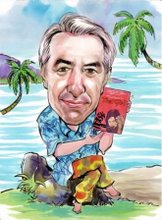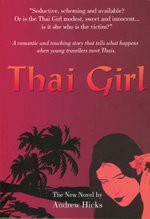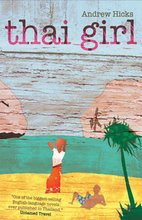
Early morning, auntie's warming the tips of her fingers.

It's often the grannies who raise all the children.

First light and they're trying to get warm outside.

And trying to get warm inside too!

A busy rice farmer's dry season activity.

Caring for the buffaloes though takes up all his time.

There's no farming to be done but you can dig up crabs.

And insects and rats and frogs.

But will his generation accept a life like this?
All around the world the end of last year and the beginning of the new one brought both freeze and squeeze to temperatures and to credit.
My son-in-law, Will tells me that back in Petersfield in the sunny south of England they’ve had temperatures of minus ten centigrade for days which is unprecedented. Now though he tells me they’re having a heat wave… it’s even hit ten degrees in the day time.
Here in our rice growing village in the North East of Thailand we too have had the biggest freeze for ten years and it’s been almost cold enough to freeze the balls off a brass monkey*. Just like Will’s ‘heat wave’, it’s fallen as low as ten degrees at night.
Showering in the morning hasn’t been fun as our water heater decided to go on the blink just when we needed it most. The electrician took it away and has been telling Cat that he’s working on it but four weeks later it still hasn’t come back, so it’s been icy showers all the way. Just when the weather’s getting hot again he’ll tell us he can’t fix it and we’ll have to buy a new one.
This morning there wasn’t any water anyway as the water pump was running all night but was pumping air. Someone must have trodden on and cracked one of the pathetic plastic water pipes, so no water, no shower and I can’t say I was too sorry.
It’s been so cold that in many provinces of Thailand an emergency was declared and the authorities are handing out blankets just as they did this time last year… which always puzzles me a little as I ask myself what ever happened to last year’s blankets. Perhaps the village people used them to light the little fires they always huddle round to keep warm.
For some unknown reason, almost before first light the folks round here leave their beds, throw open doors and windows to let the cold in and go outside and blow at a few sticks to start a fire. There they squat in the dust telling each other how desperately cold it is and warming the tips of their fingers by the embers.
It’s very sociable though and if external warming isn’t possible there’s always kindling of the internal kind. Lao khao, the rice whisky they pass around, at 40 degrees of alcohol warms the cockles of the heart very quickly.
Likewise Cat’s Mama could stay wrapped up warm in our comfortable modern house but no. She’s the first up in the morning and is out there with the best of them, brewing up a strange potion of boiled sticks which she drinks from a green mug to save her from the cold.
Now late January and well into the dry season, it should already be getting hot but with cold air coming down from China the days’ highs have barely been reaching 32 degrees. The rice harvest is long finished and the fields parched, dusty and brown so there’s precious little for rice farmers to do around here. Other than long term crops such as cassava, sugar cane and rubber, there’s no cultivation to be done. Even if there water were available, vegetables are difficult to grow as they shrivel in the sun and get stolen as soon as they are ready.
The older men pass the time with alcohol and sleep and taking the buffaloes out to the rice fields, while the grannies do the hard work of bringing up the babies and preparing what food they have.
Most of the middle generation has already gone to the towns to do the pitiable jobs that fuel Thailand’s low wage economy and which assure Bangkok’s middle classes their comfortable urban lifestyle. At this time some of the younger men also travel south to Chantaburi to cut sugar cane for a couple of months. Paid by the weight of cane they cut, this is the toughest of work. Just now the roads are crowded with huge trucks overloaded with sugar cane and twice I’ve seen them lying on their sides, their load thrown everywhere. It’s as if they’re resting.
Meanwhile a little money saved by the migrant workers trickles back home to the village for Mama and the kids. When sometimes it doesn’t come, there’s little food and that’s why the project I told you about earlier (“Thai School Girls Are So Appealing!”) which gives our village school children a good lunch every day is so very important. (See www.adoptavillgeschool.org.)
Money isn’t the only way to get food though and out in the rice fields there’s crabs and rats and insects and frogs and the children and old ladies go out there, find the holes and dig them up out of the ground. They make it look fun, but it takes hard work to produce a tiny amount of protein. The crabs have almost nothing on them and are boiled and pounded together with leaves and herbs to make a soup that adds flavour to the blandness of plain rice.
At certain seasons a few roots can be dug and leaves such as kee lek and sadao are collected to make sauces that are unpalatably bitter, but otherwise the countyside has largely been stripped bare and is no longer bountiful.
So is this poverty I now ask myself?
As the land cannot provide even the most meager living for the majority of people, it certainly seems that way. Families are thus split apart and wage earners live a non-life far from home while the elderly look after the grandchildren. If it were not for the rich community of mutual support that tenuously survives in the villages, I wouldn’t rate life here too highly.
Meanwhile, in Bangkok’s ‘Siam Paragon’, perhaps the most opulent shopping mall known to man, a dark faced woman from lower Isaan eternally polishes the glittering acres of marble floor. For this she is paid little more than 4,000 baht a month which is hardly a living wage, let alone enough to keep the child she’s left back home in the village with Mama. Meanwhile on Sukhumvit road at night the prettier young girls try their luck at winning a week’s wage by spending a few hours with a passing tourist.
In glamorous showrooms in the shopping malls there are Porsches for sale, Lamborghinis, BMWs, designer clothes and all the opulent symbols of a wealthy consumer society. The wide marble corridors are almost empty of shoppers but downstairs the food hall is packed as the Thai middle classes indulge in that most necessary of luxuries, fine Thai food and world cuisine.
Two distinct worlds thus exist in Thailand, one of near poverty, the other a thriving consumer society, the country being divided between the rural poor and those with salaries or successful businesses who can enjoy a comfortable urban lifestyle. And the tensions between these two have been causing ferment in Thai politics.
The recent political disorder in Bangkok seemed fixated on the personality cult surrounding the disgraced former premier Thaksin Shinawatra… there was little political debate on the substantive issues. The battle played out as a brutal power struggle, though who the contenders were and what principles they stood for was hard to understand. Was it the vested interests of urban society clinging desperately to their historical position, opposed by the mainly rural majority with its recently realised electoral muscle?
During the confrontation on the streets prior to the emergence of the new Democrat led government, the anti-democratic ‘Peoples’ Alliance for Democracy’ promoting the demonstrations could articulate no clear political manifesto for the future. Most vehemently it objected to the fact that Thaksin’s government had diverted substantial resources to the rural poor by giving them free health care and village lending funds. To buy the voters’ favour, they said, he was spending their hard earned middle class tax revenue on the great rural unwashed.
Such a policy in principle is right and proper however, as that wealth is substantially created by the have-nots, the low paid labourers working on the land, in sweated factories, cleaning the streets and driving Bangkok taxis. No modern economy should be run for the sole benefit of those that already have a good income to be taxed.
The new Democrat government is well aware of these crucial tensions but it has a mountain to climb if it wishes to redistribute wealth. Ironically Thaksin himself is now complaining that new Democrat prime minister Abhisit Vejajiva, a privileged product of Eton and Oxford, is now stealing his populist policies.
Let’s hope though that Abhisit has sufficient resources and does a better job of it than Thaksin, many of whose schemes were inefficient and wasteful. For example, a ‘privilege card’ project to attract wealthy tourists and business people, just axed by the new government, failed to sell and lost 1.14 billion baht between inception in 2003 and 2006 alone. (Bangkok Post, 29 January 2009.)
The stresses that have been tearing at Thailand will thus only moderate when the present inequalities of wealth and opportunity are substantially narrowed. But with agriculture unable to support a large population, the provinces should not have to remain dependant on politically motivated handouts and on making handicrafts for OTOP, one of Thaksins’s more successful projects (“One Tambon One Product”).
The rural areas should be brought firmly into the twenty first century with a modern economy of their own and that means a policy of regional development to bring jobs and industry to the people, instead of forcing them migrate southwards to Bangkok to find work. Proper jobs should come to the countryside with factories and industry in small urban centres..
How long should village people in Thailand have to remain dependent on digging crabs, rats and insects in the dry rice fields?
*So what is a BRASS MONKEY?
In Napoleonic times cannon balls were stacked high on a stand called a ‘brass monkey’. In winter water in the stand would turn to ice and expand, thus freezing the balls off the brass monkey.
Andrew Hicks The “Thai Girl” Blog. January 2009.





4 comments:
You hit it right on the head. The Thai Government should stimulate the economy by building more infrastructure in Issan area. The area has been ignored by the Thai Govern for several decades. The only time Issan had some infrastructure such as roads built was during Vietnam by the US but that was mainly for the benefits of the Vietnam War logistic. Income Tax Rates should be increased to tax the riches so as Property Tax and Inheritant Tax. The gap between the rich and the poor will only get wider if nothing change. In Thailand, you have no chance if you're born in the wrong place.
Great post Andrew. Thank you! (and stay warm)
Fantastic post, Andrew. It's great to see a true assessment of the harsh realities of life outside of the tourist centers that most people know. While most people, myself included, tend to get a romanticized image of Isaan and the poorer sections of SEA, the reality for the people living there is something quite different. I think that's why so many people that choose to leave the rat race of the west and to retire to the simple life in an Isaan village, soon find their romantic idealized view replaced with the somewhat less palatable reality of living in a third world area of a second world country. And all the baggage that comes with that, namely the rampant alcoholism, abject poverty, and scrambling to survive.
Although, I've seen poverty in many different continents and countries. And in some places like Africa, poverty leads to violence and a disregard for the value of life. In SEA, poverty is met with a smile and a grudging acceptance, and dignity I've not seen anywhere else. It's not right, but it's the way it is. And likely will not change any time soon. So best to just get on with life and enjoy it where you can. That is where Thailand is truly different from the rest of the world.
I can see that you have a fair and balanced view on things, so are well suited to finding happiness in your poor, rural village.
Bodhi
Thanks for all your comments with which I heartily agree.
Yes, rural Thais have a very special capacity to tolerate the difficulties in their live and to enjoy the richness of the society in which they live.
With urbanisation it's all changing fast though and governments ave very little time left to create a modern economy in the regions and so to preserve a way of life that has geat value.
Post a Comment